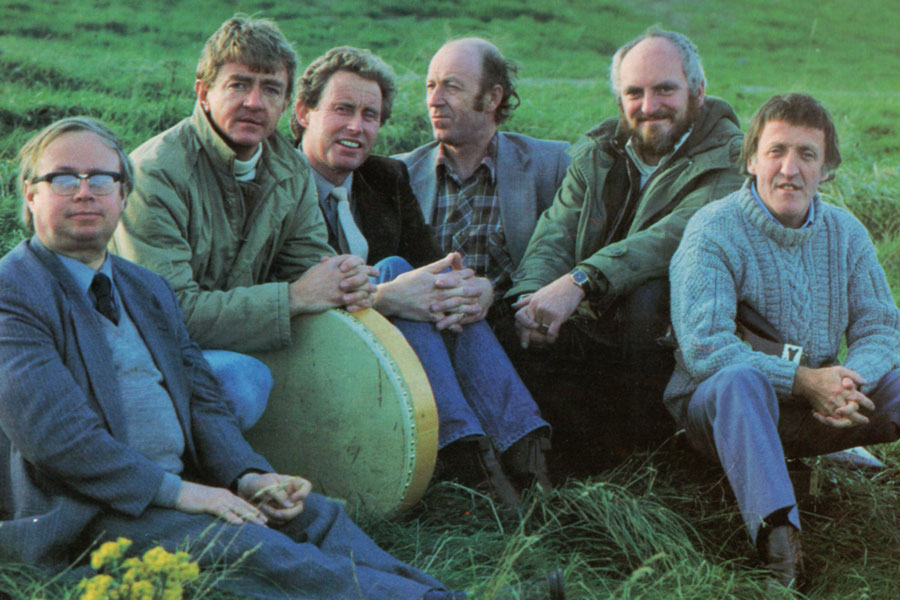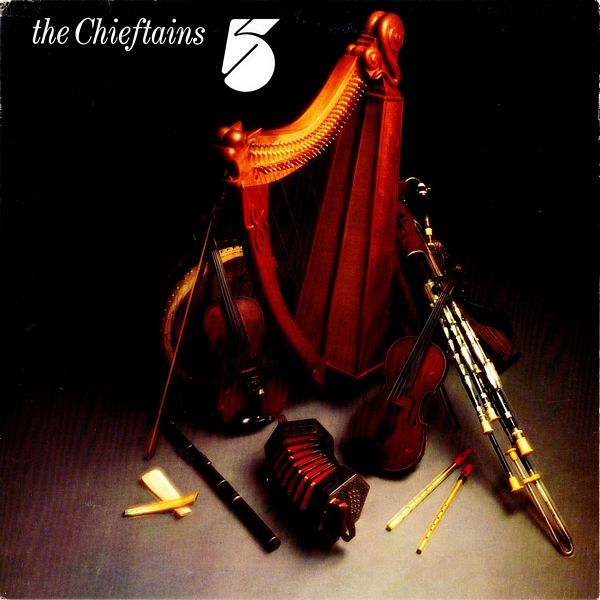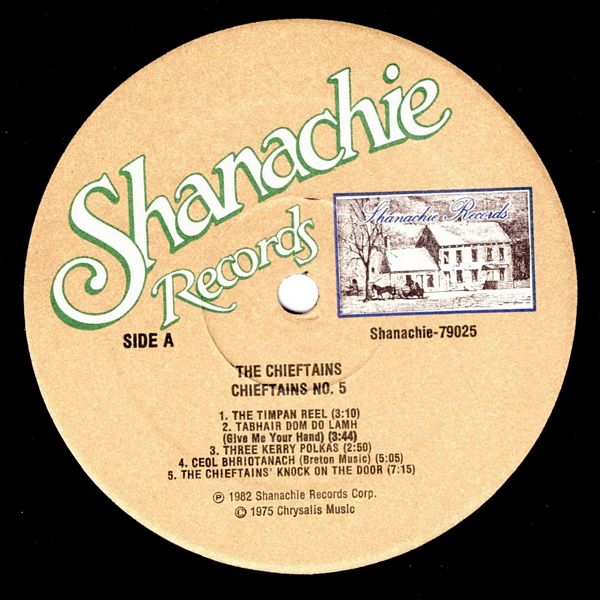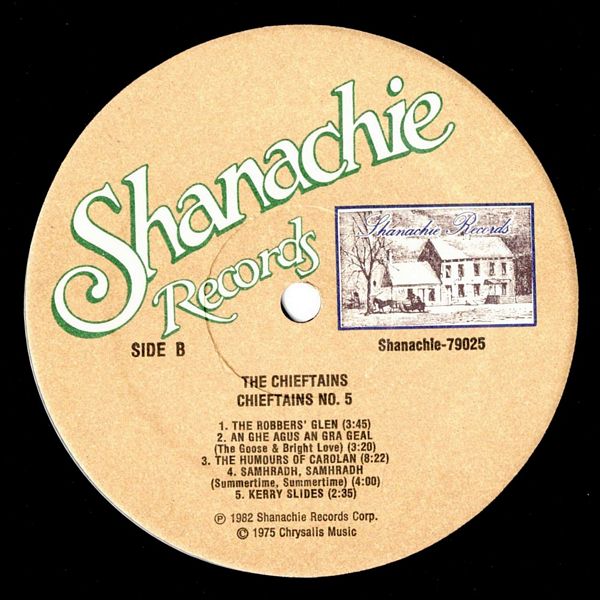

 |


 |
Sleeve Notes
For more than a decade now a gang of us have flattered ourselves we were on to a good thing. I mean we cherished a musical delivery service provided by a set of musical postmen (some of them actually worked in the Dublin GPO) called the Chieftains, a felicitous name thought up by a felicitous poet John Montague.
Now they've ceased to be a private entertainment for the Irish and have inevitably become international. The Celts keep on giving to the world, I think we're generous. Who then are the Chieftains? They are a bunch of lived in faces that play Irish traditional music, not Paddy McGinty's Goat, but the stuff that is as real as poteen. They are led by a distinguished Dublin elf called Paddy Moloney who would feel undressed without a tin whistle, and near to indecent exposure without the national bagpipe, the uilleann pipes, conveniently arranged so the player can smoke, have a jar or chat as his right arm inflates the bag, sort of a gas time while making your instrument work for you. Matching him are two Dublin men, Martin Fay and Seán Keane, who dazzle the violin into a fiddle and prove that the Irish are the ingenious Japanese of Europe 'All right the Italians invented the violin, but we've made it uniquely Irish, the fiddle'.
Whereas the classics have percussion, Corkman Peadar Mercier and his ancestors had a rhythmic clatter of din called a bodhran, a simple goat skin stretched over a round bit of wood, cured by the sun, massaged with dung and beaten with the hands or a bit of bone, or forget the drum and transfer a couple of bones and castanet your way to an exciting beat.
The tin whistle is so much more portable than a full set of pipes and Dubliner Seán Potts, who inherited piping from his grandfather, has been rivalling with Moloney since short pants, making a great and vieing musical partnership.
The flute had to be included in the band and its great exponent is Michael Tubridy who'll do you a favour on the concertina and isn't above the tin whistle, a toot, a squeeze or whistle it's all one to Michael.
The band started recording back in 1964 under the auspices of Garech Browne and Claddagh Records, but between Chieftains 1 and 2 there was a lapse of five years and the change in a musical respect was enormous. First they were good, second they were better. The next two LP's consolidated their position but with Chieftains 4 came the definitive change. Paddy Moloney had broken through into not just creative interpretation but had moved onto composition while still remaining within the framework of Irish traditional music.
But what else was needed for the band? The national emblem of the country and its black beer — the harp. And a harper was found, a classically trained musician from Belfast, Derek Bell, who looks like a permanent school boy about to pop a lump of glutinous confectionery into an ever-ready mouth but settles for the oboe and twangs a medieval Irish harp with metal strings, a replica of the Brian Boru and Queen Mary harp, a neo Irish harp, gut strung and uses a timpán, an ancient Irish instrument of the dulcimer and psaltery family, just to enrich the growing Chieftain sound.
Musically splendid, I can also commend them to my fellow drinkers, at their friskiest on a bad morning you can march and dance your liver to their music into very good order. Believe me, I've tried it and it works.
Alun Owen
The Timpán Reel — Features an instrument which in twelfth century Ireland was called the timpán and Paddy Moloney always had a hunger for its sound. Derek Bell who played its drawing room cousin, the dulcimer, got bored with listening to Paddy's oral rambling — 'Give me a nyah on that bloody dulcimer', said Paddy. 'Do you mean like this?' said Derek dexterously inverting felt hammers for wooden hits. 'But that's what I always meant' said Paddy. Derek sighed an agreement. Listen.
Tabhair dom do Lámh (Give me your Hand) — If you play for people they will listen. No? Rory Dali Ó Catháin played in the house of Lady Eglington or some such Scottish Lady but he was not heard, the foolish chatter of the tin-eared folk drove him away. The Lady ran after him calling 'Come back, come back, I'm ashamed of my house'. So Rory came back and swept away her fears and silenced the tone deaf with his impromptu 'Tabhair dom do Lámh'.
Three Kerry Polkas — If you want Three Kerry Polkas naturally you get them from East Limerick. But the second one was heard by Michael Tubridy when it was played by Peggy Ryan so naturally it was called Peggy Ryan's Fancy. Michael Tubridy got it off the end of her flute. The third polka breaks our natural rhythm and idiosyncratically comes from Kerry. Didn't Denis Murphy play it and well — remember?
Ceol Bhriotánach (Breton Music) — Celtic Music undergoes many sea changes from Scotland to Wales via Donegal and the Isle of Man and now excitingly to Brittany, where a wealth of harps, pipes and bombarde sounds out to us. The Chieftains at once recognised them. Ceol Bhriotánach is their tribute to this deep relationship, a pretty din, that we call music.
The bombarde was not an immediate equivalent sound but Derek Bell's affinity and feeling for the oboe surmounted that little razzle. Coupled with the enormous success of Breton music, naturally the Chieftains had to have a go.
The Chieftains' Knock on the Door — In this selection of tunes each member of the group responds to the 'Come in' with his own favourite, ably and continually backed by Peadar Mercier. Michael Tubridy flutes us a couple of Clare Reels' and Martin Fay follows with 'An Seán Chúilfhionn' and Seán Potts edges in with 'The Six-Penny money' then Derek Bell picks up the slow air 'Geaftaí Baile Bui' and sedately hands it on to Seán Keane to jig 'The Kid on the Mountain' before it can reel onto Paddy's piping of 'The Pretty Girls of Mayo', when the whole band keeps him company for the last two choruses.
The Robbers' Glen — In the beginning of Ireland's occupation there were always sheltered, and independent glens inhabited by nomadic, free Gaels whose life was so incomprehensible to the orderly English, it could not be tolerated. Freedom and roaming had to be equated with thieving and robbing. What do you do? Root them out. The Yeomanry left their wives and children and marched to expiate the vipers. But this time they lost.
Paddy Moloney cross fertilises tradition and creation to shape this sound into an oral picture of the times. An Ghé agus an Gra Geál (The Goose and Bright Love)
What better time to court and pursue a working Irish girl than when she's alone at evening driving home a gaggle of geese? This was the custom and the young lovers ardour builds to a musical crescendo that echoes the exciting, furious flapping wings.
The Humours of Carolan — In the space of seven of the great, blind, harper Carolan's compositions, the Chieftains attempt to give a real feel for the man, happy, wistful, firm or full blown, these are Carolan's jewels.
Samhradh, Samhradh (Summertime, Summertime) — The music of the Chieftains is closely linked with the land and with the seasons the land changes as does its colours and sounds. In this piece Paddy Moloney and the band try to reflect these changes from throbbing Spring through blazing Summer to a fading, glowing Autumn. Paddy left out Winter, its a miserable time even on its good days.
Kerry Slides — For the finale of the record the Chieftains had a great, wild time and were joined by an old friend and bone man Ronnie McShane (he was met in the street). It became a joyous reunion and a fine, ensemble piece of calculated abandon to finish off the day.
Alun Owen
Alun Owen is Wales' most notable export to Ireland. Author of innumerable TV and film scripts, he was very much involved in the career of another musical group having written 'A Hard Day's Night' for the Beatles.